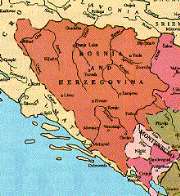


| Back | Timeline | Library | Search | Home | Help |
1908-09 - The Bosnian Crisis
 |
| Bosnia-Herzogovina as of 1878 |
"The dirty Jew has deceived me. He lied to me, he bamboozled me, that frightful Jew."Russian Foreign Minister Izvolsky to German Chancellor von Bulow on Austrian Foreign Minister von AehrenthalThe principal players in the Bosnian Crisis of 1908-09 were the foreign ministers of Austria and Russia, Alois Lexa von Aehrenthal and Alexander Izvolsky, respectively. Both were motivated by political ambition, the first would emerge successful and the latter would be broken by the crisis. Along the way, they would drag Europe to the brink of war in 1909. They would also divide Europe into the armed camp that it would remain until 1914. Under the Treaty of Berlin, the Dardanelles, controlled by Turkey, would not allow the passage of warships of any country to or from the Black Sea. This agreement bottled up a portion of the Russian Fleet that could have been well used at Port Arthur during the Russo-Japanese war four years earlier. Izvolsky wanted this changed to allow the passage of only Russian ships through the straits. This would give Russia a Mediterranean presence and, it was perceived, help her recover some face after the bitter defeat by Japan. Aehrenthal wanted full control of Bosnia-Herzogovina though annexation even though Austria-Hungary had administered the provinces since 1878. His reasons for this lay in the possible recovery of the "sick man of Europe", Turkey. The "Young Turk" revolution of 1908, led in part by Enver Pasha, convinced some that the Ottoman Empire might be on the rise again. Thus, Aehrenthal reasoned, it was now or maybe never. He would discuss this matter with Izvolsky to ensure the Russians would not interfere with the annexation plans. The two ministers held a meeting on 19-Sep-1908 at the Buchlau castle of Count Leopold von Berchtold where they agreed on the following plan: Izvolsky would ignore the annexation and, in turn, Aehrenthal would back the opening of the Dardanelles to Russian warships. At the same time, Bulgaria would declare its independence from Turkey, and both would allow this. The Austrians would also give up some territory in the Balkans to keep Serbia quiet. Not exactly an ethical deal, but it would get them both what they wanted. The key to the plan was timing - their plans would have to be announced simultaneously if the ploy was to be successful. Aehrenthal moved quickly, faster than his partner in crime, Izvolsky. He acted on 3-Oct-1908 under the premise that Austria-Hungary was taking control of Bosnia-Herzogovina so that the people there could enjoy the benefits of the Empire as a reward for economic advancement since first being administered back in 1878. A seething Serbia could hardly believe this action and demanded Russian intervention. This left Izvolsky holding the bag. He announced his plans for the free passage of Russian warships though the Turkish straits but was shot down by every other signatory to the treaty - especially Britain. The British said they would consider opening up the straits to all warships but would not limit it to Russian ships alone. This is hardly what Izvolsky had in mind since this had the potential of letting belligerent ships into the Black Sea. Germany, at first, viewed the whole tangle with disdain taking the Turkish side. The Kaiser had been working on strengthening relations with Turkey and, now with the chance of Ottoman recovery, he wished to stay this course. As the Crisis continued, the Kaiser was forced from the diplomatic scene by the Daily Telegraph Affair. Events reached a fever pitch when, in early November, the Serbian army mobilized. Germany now took the Austrian side stating it would stick by its ally. Russia, wishing to support Serbia, but not really ready for war with Germany and Austria was forced to back away when the Austrians threatened to publish the details of the agreement between Aehrenthal and Izvolsky. The fact that she had betrayed her Slav ally beforehand was not a fact that Russia wished widely publicized. Izvolsky remained at his post for three more years but his reputation was ruined beyond repair. The Russians backed down and urged Serbia to do likewise, which she did and declared publicly that the annexation was none of her business.War was averted for the time being but the results were a bitter Russia and an enraged Serbia. Russia vowed, if ever confronted in this manner again, she would not back down - a vow that would be kept in a few, short years. |
| Back | Timeline | Library | Search | Home | Help |